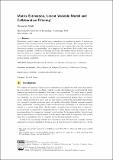| dc.contributor.author | Shah, Devavrat | |
| dc.date.accessioned | 2021-11-23T16:17:33Z | |
| dc.date.available | 2021-11-08T20:35:13Z | |
| dc.date.available | 2021-11-23T16:17:33Z | |
| dc.date.issued | 2017 | |
| dc.identifier.uri | https://hdl.handle.net/1721.1/137821.2 | |
| dc.description.abstract | © Devavrat Shah. Estimating a matrix based on partial, noisy observations is prevalent in variety of modern applications with recommendation system being a prototypical example. The non-parametric latent variable model provides canonical representation for such matrix data when the underlying distribution satisfies “exchangeability” with graphons and stochastic block model being recent examples of interest. Collaborative filtering has been a successfully utilized heuristic in practice since the dawn of e- commerce. In this extended abstract, we will argue that collaborative filtering (and its variants) solve matrix estimation for a generic latent variable model with near optimal sample complexity. | en_US |
| dc.language.iso | en | |
| dc.relation.isversionof | http://dx.doi.org/10.4230/LIPIcs.FSTTCS.2017.4 | en_US |
| dc.rights | Creative Commons Attribution 4.0 International license | en_US |
| dc.rights.uri | https://creativecommons.org/licenses/by/4.0/ | en_US |
| dc.source | DROPS | en_US |
| dc.title | Matrix Estimation, Latent Variable Model and Collaborative Filtering | en_US |
| dc.type | Article | en_US |
| dc.identifier.citation | Shah, Devavrat. 2017. "Matrix Estimation, Latent Variable Model and Collaborative Filtering." | en_US |
| dc.contributor.department | Massachusetts Institute of Technology. Department of Electrical Engineering and Computer Science | en_US |
| dc.eprint.version | Final published version | en_US |
| dc.type.uri | http://purl.org/eprint/type/ConferencePaper | en_US |
| eprint.status | http://purl.org/eprint/status/NonPeerReviewed | en_US |
| dc.date.updated | 2019-07-10T16:22:39Z | |
| dspace.date.submission | 2019-07-10T16:22:40Z | |
| mit.metadata.status | Publication Information Needed | en_US |
